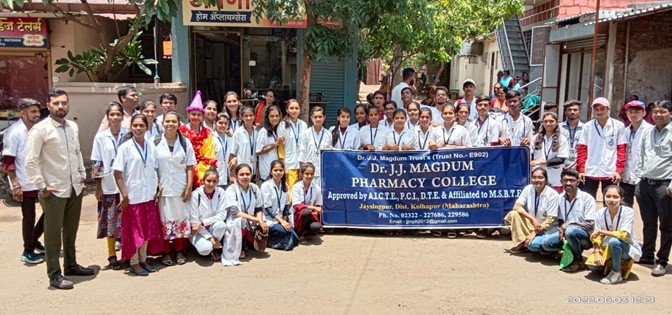05/06/2022
“Garbage Disposal and Community Health”
A Service-Learning Activity by the Students of
Dr. J. J. Magdum College of B. Pharmacy, Jaysingpur, Maharashtra,
in Collaboration with The
Bahá’í Academy, Panchgani
1-3 June 202
Introduction: AService Learning Activity was conducted in collaboration with Dr. J. J. Magdum College of Pharmacy, Jaysingpur and the Bahá’í Academy, Panchgani as part of the course “Me, My World and My Mission”. The objectives of the above said course are to assist the students to know themselves, their world, and their mission in life, based on their unique talents and capacities. Secondly to nurture their moral and spiritual qualities, develop the right attitudes, and practice the human skills that are central to self-development and building capabilities for making a better world, and thirdly and most importantly, to engage in community projects through Service Learning Activities. Eighty-one students of 2nd year B. Pharmacy in the town of Jaysinghpur, Maharashtra (India), carried out this Activity. They were guided by the Baha’i Academy resource persons. The focus was to investigate garbage disposal and its impact on the community health there.
Inaugural Programme: On day one the inaugural programme was held in the presence ofthe CollagePrincipal Dr. S. S. Patil, faculty Coordinator Mr. Vinod Patil, Dy-Director of the Baha’i Academy Mr. Rajan Sawant, Research Coordinator Dr. Suchitra Godbole, Service-Learning Activities Coordinator Mr. Navnath Bomble, and Service-Learning-Activities Supervisor Mr. Sangram Sapkal from Baha’i Academy, Panchgani and all the students of the second year of B. Pharmacy. During the inaugural programme, Mr. Rajan Sawant talked about the Academy’s course “Me, My World, My Mission” which the students had taken and the final community engagement they were going to undertake.
Four Stages of Service Learning Activities: Students were introduced to the four stages of Service Learning Activities i.e. Preparation, Implementation, Evaluation, and Presentation. Dr. Godbole made a presentation on the “Garbage Disposal and Health Issues”. The initial preparatory discussions prepared the students to see the problem of garbage disposal and community health from the perspective of their academic course in pharmacy discipline. The process of the Service Learning Activities (SLA) was explained by Mr. Rajan Sawant and Mr. Navnath Bomble. The students, then, provided their inputs in framing some survey questions and suggested the neighborhoods to be visited. Students were then divided into 4 groups to collect date through survey and interviews, to assess the problem of garbage disposal in Jaysingpur. Each groups was again divided into teams of 4-5 students. The first group visited households, shops, vendors, and small businesses. The second group visited hospitals and private clinics. The third group visited Medical Stores and the fourth group visited the Municipal Corporation office. Seventy-eight responses were received from Households and shops/vendore, 26 responses were received from Medical Shops, 17 responses were received from Hospitals and Public Health Center. While visiting the community neighbourhoods, students observed and took notes and pictures as well as videos recoded some instances. The officers of the municipal corporation gave information about how garbage was being collected and disposed off.
Analysis of the responses: On Day Twoall the teams that had conducted the surveys and interviews gathered at the College to analyze their data and formulate their findings. Each group, i.e. households, hospitals, medical shops and municipal corporations that had been given a different questionnaire to assess the actual situation began sharing their experiences and analyze the data.
Interpretation of the data received: The data received to each question from different localities, hospitals, and medical shops were now presented in graphic forms. They were as follows.
Observation 1: 66% of people responded that they were giving their waste to a municipal waste collection vehicle. Whereas 23% of people responded that they disposed off their household wastes in the common dustbin.
Observation 2: According to the responses received from households 44.9% believed that Plastic bags were the biggest problem, and 33.3% said that kitchen waste was a major problem.
Observation 3: The major source of garbage in the municipal waste came from households as can be seen from the responses of 47.4% households. Industrial Units and Hotels equally contributed to the garbage problem that constituted 15.4% of the responses, while 14.1% responded that shops also contributed to the garbage problem.
Observation 4: From the responses received 44.9% respondents said that garbage was thrown into the drainage system by the households and 43.6% respondents said that people throw garbage along the roadside.
Observation 5: 71.8% households replied that garbage was collected daily, whereas 28.2% replied that garbage collection was not regular.
Observation 6: 38.5% of households replied that the diseases they contracted could be related to the garbage disposal.
Observation 7: From the responses to this question, it was observed that the prevalent diseases were Dengue, Chicken Gunia, Malaria, Cholera, Typhoid, Parasitic infections, food poisoning and fever.
Observation 8: It was observed that both children and adults had been affected by these diseases.
Observation 9: When the medical shops were contacted, they mentioned following items out of the major waste that was generated in large quantities by their shops: dry waste like the cardboard boxes, glass, syringes, plastic, boxes, and medicines that had crossed expiry date, etc.. There is no wet waste generated as such.
Observation 10: The Pharmacy shop owners said mostly they were giving all their waste to the municipal waste collection vehicle.
Observation 11: Only 30% respondents knew that for the biomedical waste disposal there were guidelines, while 69.2% people were unaware about any such guidelines.
Observation 12: When the Pharmacists were asked this question the response was that there was regular sale of mosquito repellents.
Observation 13: From the responses it was observed that people were irresponsible about waste disposal and that these diseases could be due to the improper management of waste.
Observation 14: From the above responses the following diseases were mentioned to spread due to the exposure to waste. They were Whooping cough, common cold, chicken Guniya, Cholera, Dengue, Malaria, Various types of fungal infections, etc.
Happy Hippo Show: Happy Hippo Show is an interactive theatre. It helps students to consult with community members and mobilize them to address various issues of the community and to find solutions to them. Based on the findings and interpretation of the surveys and interviews in Jaysingpur, the students prepared a Happy Hippo Show to address garbage disposal and health issues the people were facing. Two Shows were successfully conducted. Their purpose was to generate awareness among the people. During Happy Hippo Show, students and people discussed how garbage could be segregated and its impact on community health. Accordingly, students and community people decided that they would segregate garbage and will maintain cleanliness in their surroundings. This gathering was attended by six city officials and their colleagues.
After the first Happy Hippo Show students went to individual households in Ward No. 6 and shared some guidelines with the stakeholders and discussed action plans with the community members. During the interactions the students explained to both men and women that they were equally responsible for managing the garbage disposal of their household.
Action Plans included the following points:
- Every household should segregate at source wet waste from dry waste.
- Segregate the plastic waste and give it separately to the waste collectors.
- Not to burn plastic in the open. It can be harmful to the health and environment as its releases poisonous gasses.
- Electronic wastes such as mobiles, batteries, chargers, etc. should be disposed off separately.
- Waste papers, cardboard boxes, etc. should be segregated.
- Do not put kitchen wastes in the plastic bags for disposal.
- Do not throw household waste in front of the houses, roadside, and open drainage. It should be given to the Municipal Waste collection vehicle.
Final presentation:
After this activity and based on the findings from the analysis of the data received, students made a presentation to the authorities of the Municipal Corporation in the College seminar hall. The Principal, all faculty members and all students were present for the presentation. PowerPoint presentations and videos were shown and discussed. The Authorities of the Municipal Corporation welcomed this initiative and also discussed their plans for the collection and disposal of the city wastes. He also informed about the initiative for the disposal of wet wastes, i.e. a vermicomposting system that will start functioning soon. The Municipality have also installed a machine for shredding of plastic waste. The municipality high official offered to collaborate with the College a few times a year to address the issue of creating awareness among the people of the city.
Download Attachment





